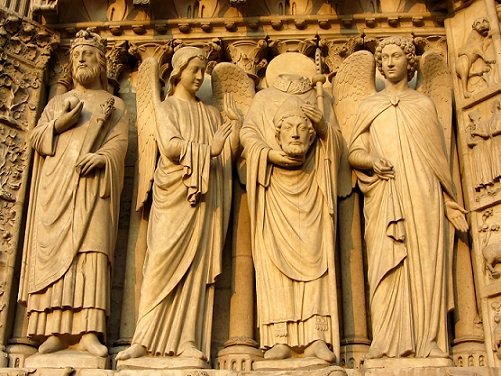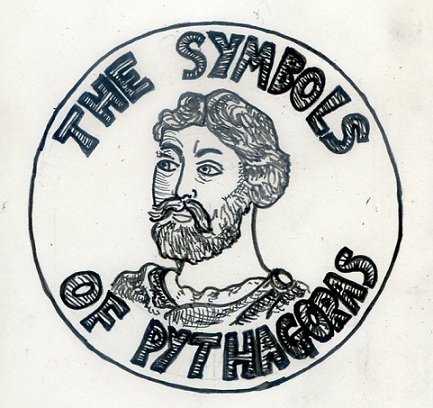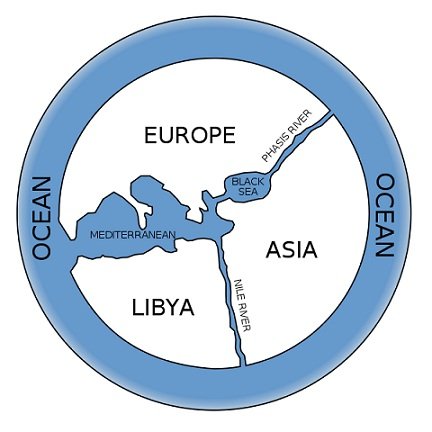ADSactly History - The Contributions Of Egyptian Philosophy To The Wider World - A Survey Of Ancient Greeks (pt1)
The Contributions Of Egyptian Philosophy To The Wider World - A Survey Of Ancient Greeks [Part 1]
In our last post, we took a look at the ingeniousness displayed by Egyptian scientists cum philosophers. In deed, science during the ancient times (particularly during the Neolithic era) was regarded as a sub-discipline of philosophy, like we saw from our last post, and "philosophy" itself has been translated to mean "the love of wisdom". In the concluding part of our last post, a statement was made that western philosophy hinges around African philosophy and their history cannot be told without talking about the contributions of African philosophy.
Here, we will be looking at how Africa has contributed to the development of philosophy and other ancient scientific disciplines of the wider world. We will be doing a review of some significant ancient Greek philosophers and how they were influenced by African philosophy, particularly Egyptian philosophy.
Ancient Greek
Some people have considered Greece as the home of philosophy but taking a look at this holistically, some of their areas of knowledge like astronomy, mathematics, and even philosophy itself were gotten from their interaction with Ancient Egyptian scholars. For a better understanding, we will break this survey into two parts - The Pre-Socratic philosophers and the Socratic philosophers. We will take a look at the first part here and conclude in the next post.

Pre-Socratic philosophers
These were considered as the earliest of the philosophers before the time of Socrates (a moral philosopher) who was considered to be among the founding fathers of western philosophy. The philosophers that existed before Socrates were called "natural philosophers". This is because they were majorly concerned with the study of nature. Awesomely enough, almost everyone on the list had some form of experience from Egypt and were incorporated into the mystery school system of Egypt under ancient Egyptian scholars (who were also priests).
One of the major characteristics of Pre-Socratic philosophers was their interest towards the phenomenon of "change" as it relates to physical matter. For example, they were regarded as the earliest philosophers to study and answer questions relating to origin of the "world-stuff". Let's take a look at some very significant Pre-Socratic philosophers - we'll only make reference to five of them.
Pythagoras
Pythagoras is a very popular name, especially among mathematicians. No doubt, many of us must have come across the Pythagoras theorem in mathematics (as it relates to right-angle triangle), he has been credited for proposing that theorem. Observably, Pythagoras schooled in Egypt for a total of 22 years [ref] and was inducted into the mystery school by Egyptian priests.

From Pythagoras' point of view, the whole world, without the exception of the observable universe, is made up of shapes and figures which can be numbered and counted - no wonder his love for mathematics. He also had a strong belief that the number "1" is the source and origin of others numbers and others are gotten from "1". Asides mathematics, he also majored in theology, moral ethics, physics, music and even philosophy itself. He lived around 582 BCE to 497 BCE.
Thales of Miletus
Thales is another very popular Greek philosopher and also considered as one of the founding fathers of western philosophical sciences. In contrast to pythagoras that believed in numbers, Thales believed in water, which he considered as the absolute source of everything [ref]. Awesomely enough, Thales was also a student of the mystery school system of Egypt.
Thales also majored in astronomy and has been credited for his feat of accurately predicting the eclipse that happened in 585 BCE - all thanks to the knowledge of astronomy he gained while he studied in Egypt. Thales lived around 620 BCE to 546 BCE and created massive impact in western philosophy.
Heraclitus
We saw that Pythagoras believed in numbers, Thales believed in water, but Heraclitus believed that "fire" is the absolute "world-stuff". He also made exposition on the universal law of change which stated that change is the true reality and it's permanent. Thales also was among the earliest philosophers to propose the theory of negative matter - that is; for everything that exists in the observable universe, there is always an opposite to it: like life and death, weakness and strength, sleeping and waking etc. He also had a formal education in Egypt under priest scholars and he lived between 535 BCE to 475 BCE.
Anaximander
Anaximander is another great Greek Pre-Socratic philosopher who lived between 611 BCE and 547 BCE and was a student of Thales (that we reviewed earlier). Being a student of Thales, Anaximander worked on the existing philosophies of his master but in addition to that, he proposed that the "world-stuff" is relatively infinite and not "water" as his master had said.
From Aniaximander's assumption, all things that currently exist came from something the pre-existed and the original "stuff" cannot be destroyed and has no beginning (maybe this is where Dalton's atomic theory of the indestructibility of atom came from). Anaximander was also an astrologer and has vast knowledge of astronomy from the knowledge he picked in Egypt. One of his greatest feats was; being among the earliest Greeks to have an earth's representation on a map [ref].

Democritus
This is the last Pre-Socratic philosopher we will review. His works were mainly centered around the basic components of matter (or what you call "atom"). He worked extensively to prove that everything is composed of atom which are infinite and vary both in shape and sizes. This is just to let you know that atomic theory pre-dated Dalton - though Democritus didn't expressly term it "Atomic theory" but the description falls in line with modern atomic theories. As a matter of fact, his works will suffice to be termed "Doctrine of matter" instead of just "Atomic theory".
Democritus lived around 460 BCE and was one of the students of the Egyptian mystery school. No doubt, his works on atomic theory have remained even till this present time.
Apart from these five Pre-Socratic philosophers that we have reviewed, here's a list of other significant ones who had an Egyptian experience.
- Anaxagoras
- Anaximenes
- Parmenides
- Empedocles
- Zeno
One very common thing among these Pre-Socratic philosophers is; they either studied in Egypt or made use of Egyptian curriculum. This is to prove the fact that western philosophy has a strong connection with the Ancient Egyptian philosophy.
Authored by @samminator
Click on the coin to join our Discord Chat

Witness proposal is here:
Go To Steem Witness Page
In the bottom of the page type: adsactly-witness and press vote.

Use small letters and no "@" sign. Or, click here to vote directly!
Thank you!
Men who want to know about the world must learn from it in detail, said Heraclitus. And I believe that this is the basis not only of philosophy but also of science. This is how pre-Socratic people have a characteristic, which seems to me fundamental for research and reflection, they always asked about all the phenomena they observed. One of the most relevant questions was, where does life come from? And precisely, as you reflected in your post, many of those answers were in some natural phenomena. Interesting series, @sammminator.
@samminator, History and Ancient Mysteries are very interesting aspects. And without any doubt it's really important to understand and decode the Ancient Belongings because we have so much to know, learn and understand yet.
And some say that people who understand Egypt completely they understand the creation and creator perfectly. Let's see if we can get to know about the unknown aspects of Egypt.
Posted using Partiko Android
The presocrats are a set of philosophers of the most significant for me. Of them I have devoted some attention to Heraclitus, particularly for his fragmentary writing. An aphorism that has been badly translated is very repeated, which in reality, according to the most versed studies, would be: "Diverse waters flow for those who bathe in the same rivers". It is one of the most important, because it expresses his changing vision of things. There is another less well known, apparently simple and very beautiful: "The sun is new every day". I have also been interested in Pythagoras because of the relationship between numbers and music, and the rhythm of the universe. And Zenón de Elea, for the paradox of Achilles and the turtle, so well commented by the contemporary writer Jorge Luis Borges.
Thanks for your synthetic post, @samminator.
This publication is fascinating. It is the presentation of complex and complicated conference topics, exposed in a simple and entertaining way. I congratulate you @samminator because you got a nice article. Of the pre-Socratic thinkers Pythagoras call me attention (for his great mathematical Theorem); Heraclitus (for his way of perceiving the world and its philosophical concepts) and Zenon (for his contributions in the philosophical paradoxes and later controversies). And to think that all have influences of the Egyptian School. Thanks @adsactly for the variety of topics published during this week. A pleasure to read you in steemit
Interesant history...
Posted using Partiko Android
interesting post, @abduljalil.mbo likes to vote for your post, keep your work, happy surfing on steemit in esteemapp. have a nice day happy work @adsactly